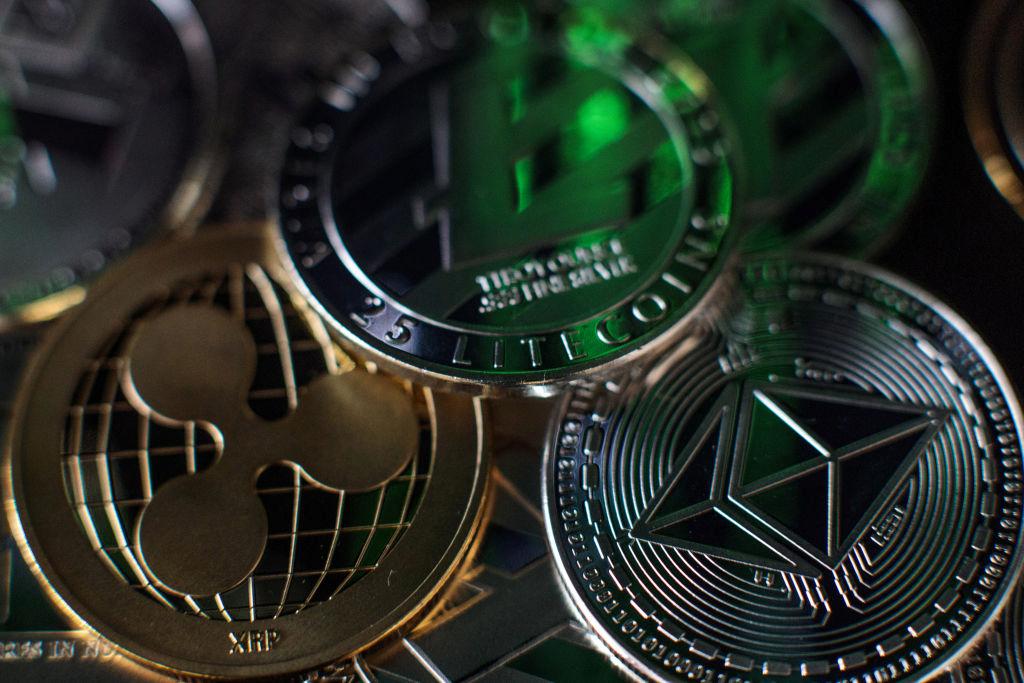Responding to demand, Islamic microfinance start-up starts accepting cryptocurrencies for zakat
Photo: Illustration of the litecoin, ripple and ethereum cryptocurrency arranged for a photograph on April 25, 2018 in London, United Kingdom. Getty Images/Jack Taylor
*Paras 18 and 19 have been corrected to clarify the process of crypto zakat payments
JAKARTA - Islamic microfinance start-up Blossom Finance has started accepting zakat payments in cryptocurrencies for zakat-eligible cryptocurrency assets in response to user demand, Matthew Joseph Martin, its CEO told Salaam Gateway.
Zakat is an annual 2.5 percent tithe that is mandatory on Muslims who meet a minimum amount of wealth.
“[A woman in the U.S.] said she had $20,000 in zakat to pay on her crypto assets but was not able to find a facility to send zakat payment from her cryptocurrency assets,” said Martin.
U.S.-registered Blossom Finance now accepts zakat payment in cryptocurrencies directly via the blockchain to a designated wallet address held at a cryptocurrency exchange in Indonesia.
Blossom, which has an office in Jakarta, will then channel the zakat to the Indonesian financial cooperative Baitul Maal Wat Tamwil (BMT) that will distribute the funds to any of the 87 microfinance institutions that the start-up has agreed to partner with.
According to Martin, the U.S. zakat-payer’s $20,000 in cryptocurrencies will be channeled to non-profit institution Rahmania Foundation in Sumatra that manages donations to help orphans and needy children.
DEMAND
The number of people buying and selling cryptocurrencies has grown rapidly in Indonesia.
The CEO of the country’s biggest crypto exchange, the Indonesia Digital Asset Exchange (Indodax), Oscar Darmawan told Bloomberg in March the platform had 1.14 million investors since launching in 2014, and he expects the number to reach 1.5 million by the end of the year.
In comparison, the 106-year-old Indonesia Stock Exchange (IDX) had 1,118,913 registered investors as at December 20 last year, according to a statement from the IDX Custodian on December 27, 2017.
“If we estimate 85 percent [of Indodax investors] are Muslim - that would put the number at 1.2 million Muslims [by the end of the year] with cryptocurrency just in Indonesia,” said Martin. Around 85 percent of Indonesia’s population is Muslim.
Due to the decentralised and peer-to-peer nature of cryptocurrencies on the blockchain, there is no available data for the demographics of people who hold crypto assets.
FULLY AND IMMEDIATELY
There is an ongoing discussion in the Islamic finance industry about the Shariah compliance of cryptocurrencies and there is no clear guidance on their permissibility.
The main issue is if cryptocurrencies are categorized as ‘ribawi’, or interest-bearing, that includes commodities such as gold and silver which must be transferred fully and immediately.
This means they must be bought and sold in equal quantities and with immediate transfer of possession to avoid exchanging unequal amounts that would constitute riba.
If zakat paid in cryptocurrencies are converted into fiat currency, the full value of that zakat may not be received by the beneficiary if additional exchange or bank fees are incurred.
“If the [crypto] money was first converted into fiat, there would be exchange fees plus bank transfer fees plus other exchange fees when received in the destination country,” said Martin.
“We’ve consulted with our internal Shariah advisory about this matter, and exchange fees incurred when converting from cryptocurrency to local currency qualify as part of the total zakat payment. Even still, we’ll do our best to trade the crypto in a way that incurs minimal or no fees,” Martin said in a separate media statement.
The crypto zakat payment on crypto assets is completed once deposited in the Blossom-designated wallet.
Following this, if zakat recipients request the funds in fiat currency Blossom will convert them "within a few minutes of being received” after confirmation on the blockchain, said Martin.
The process of peer-to-peer validation of a transaction on the blockchain could typically take anything from 10 minutes to an hour.
Blossom Finance will not be taking a fee for providing the zakat payment facility. The company’s aim is to provide a working model for zakat collection and management organizations, said Martin.
(Reporting by Yosi Winosa; Editing by Emmy Abdul Alim emmy.alim@thomsonreuters.com; with support from Abdulaziz Goni)
Our Standards: The Thomson Reuters Trust Principles
© SalaamGateway.com 2018 All Rights Reserved
